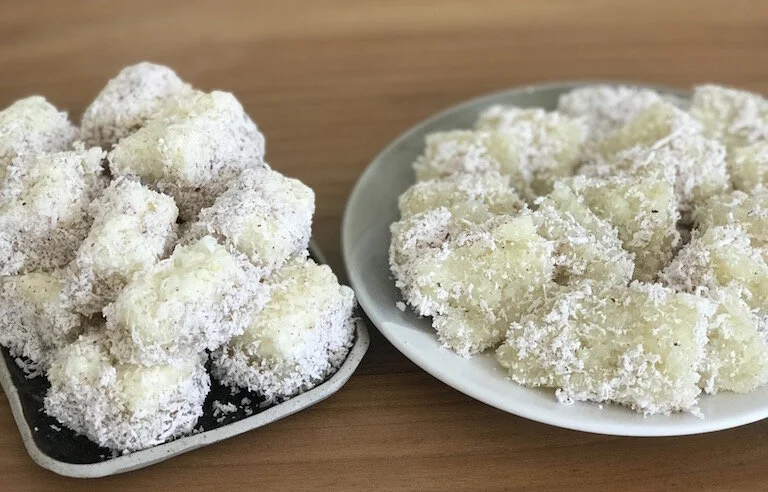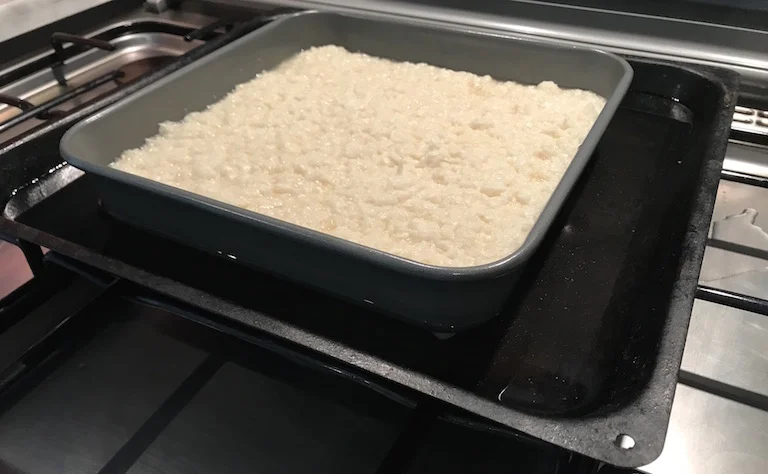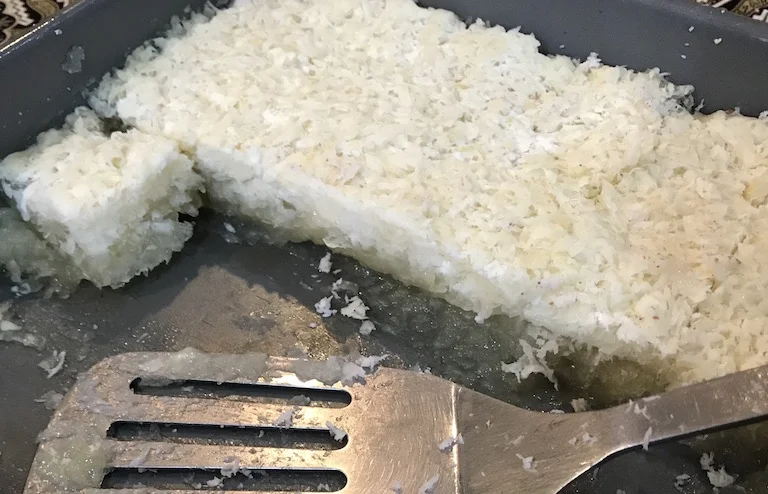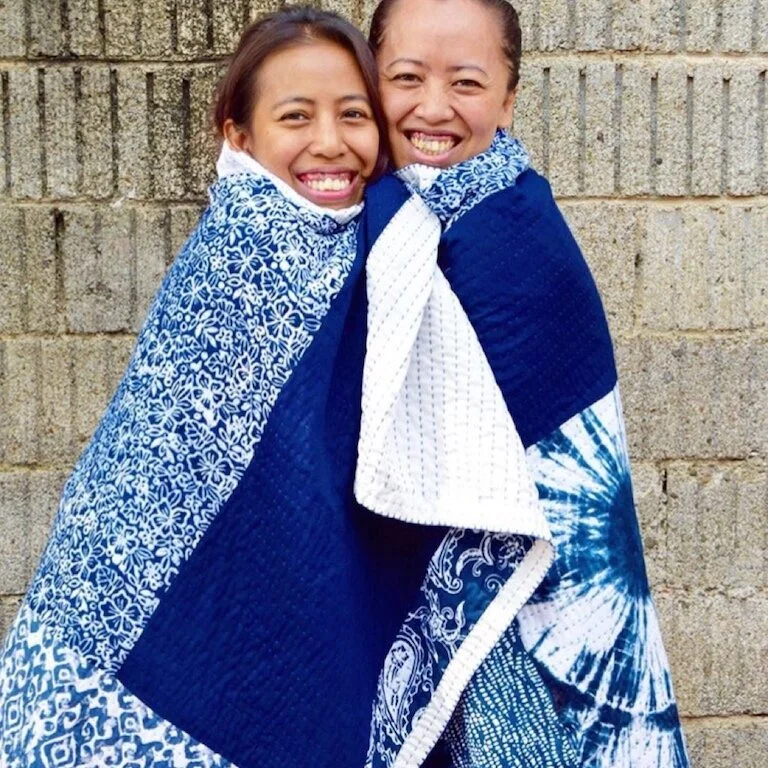How to make Delicious Gluten-Free Cassava Cake
Today’s recipe has been kindly supplied by Almond Zucchini - a cooking studio in South Jakarta. We first tried *Kue Singkong (Cassava cake), when we visited The Local Market in Kemang a few months ago. Liz and I got chatting to Cindy, from Almond Zucchini. There, sitting on the table at her booth was a plate piled high with Kue Singkong. Cindy invited us to try some.
Coincidentally we had just received a comment from one of our blog readers informing us that, although they had enjoyed our post, Traditional Cakes and Sweets of Indonesia, that their favourite cake (which happened to be Kue Singkong) was missing from our list. Upon seeing the cake, we eagerly sampled a piece. Immediately we understood why Kue Singkong is widely loved across the Indonesian Archiepeago, deserving a place in our Post. Cindy explained that the recipe is VEGAN, GLUTEN-FREE and EASY to make! Luckily she also promised to share the recipe with us. So to all of you out there, and especially to our passionate Kue Singkong eater, this story is for You!
Happy Cooking and more importantly, Happy Eating!
How to Make Kue Singkong
Four simple ingredients is all you need to make Kue Singkong
Cassava Cake
Ingredients
1kg finely grated cassava (see Cook’s Notes below re: ‘Choosing texture of your cake’)
260g sugar
500ml water
1 packet agar-agar
Method
1. Before cooking, prepare your steaming equipment on the stovetop (see below for a simple and effective set up)
Into a roasting pan, place some ceramic baking beads. These will elevate the cake and prevent direct contact between the flame and the baking tin
steaming kue singkong
Place cake carefully into water bath ensuring it is centred over the flame. Top up with water to ensure even steaming of the mixture
2. Into a large mixing bowl, combine the grated cassava, water, agar-agar and sugar. Mix well
3. Pour mixture into a baking tray ensuring even thickness and steam for approximately 60 minutes (see Cook’s Notes below re: ‘Moderating cooking time’)
4. Meanwhile, prepare Steamed Shredded Coconut as per recipe below
5. Once cake is cooked (firm to the touch), cut into small cubes and roll in steamed shredded coconut. It is best to complete this step when the cake is still warm
6. Serve either warm or cold - and traditionally with a cup of teh manis (sweet tea) or kopi (coffee)
For many Indonesians, the idea of Kue Singkong with a cup of sweet black tea is the perfect afternoon snack
For me, I prefer mine with a short black coffee
Steamed Shredded Coconut
The simple ingredients required to make the steamed coconut
Ingredients
500g fresh shredded coconut (see Cook’s Notes below re: ‘Where to source your ingredients’)
2 tsp sea salt
Method
Mix shredded coconut with salt
Steam for 30 minutes then set aside to cool
Whilst your cake is steaming, steam your shredded coconut as well
Allow the shredded coconut to cool before using
Cook's Notes
Where to source your ingredients:
We bought our singkong from a local pasar; in fact my *pembantu Ibu Tuti kindly picked up some singkong for me on her way to work one morning, from her local pasar in Depok, West Jakarta.
Ibu Tuti also purchased two fresh coconuts from the local ‘toko kecil’ (small shop) in our neighbourhood. She drained them of their coconut water and then grated the flesh, squeezing out extra water from the coconut meat.
Agar-agar can be purchased in most supermarkets and pasars. It is generally found in the section where you find jelly and other packaged desserts.
Here's where you'll find the agar-agar
How to pick the perfect singkong for this recipe:
When choosing your singkong, go for the ones with a slightly softer, more springy texture. Singkong that are really hard have a tendency to be a bit bitter.
How to store excess ingredients:
Any extra grated cassava or shredded coconut can be placed in a clip lock bag and frozen for future use.
Moderating cooking time:
This recipe generally takes about 70 minutes to cook on the stovetop with an open steam bath. If you are finding that the cake hasn’t firmed up by 50 minutes, cover the cake with aluminium foil to trap some of the steam. This will hasten the cooking time whilst still keeping the cake moist.
Choosing the texture of your cake:
Prefer your cake to have a smoother consistency? Take the grated singkong and place it in a food processor, along with the sugar, water and agar-agar. Process for a few minutes to create a smooth batter. If you do not process the singkong after grating, a cake that has two distinct layers with result (still delicious!).
Use a fine grater to prepare your singkong
Grated only, the Kue Singkong will appear as two separate layers when steamed. I prefer it this way.. but the more refined version (using a food processor) is also delicious!
Interesting Facts about Cassava
1. Throughout tropical and subtropical regions, Cassava is grown for its tuberous root which is a major source of carbohydrates
2. Cassava is known as Singkong in Indonesia and is also commonly known as Yuca and Brazilian Arrowroot
3. Cassava is native to South America
4. The dried extract of Cassava is known as Tapioca
5. After Rice and Maize, Cassava is the third largest source of carbohydrates in the Tropics
6. Cassava can grow in nutrient poor soil and is a drought-tolerant crop
7. Cassava can only be eaten in cooked form as raw cassava contains residual amounts of cyanide which can cause significant health problems
About Almond Zucchini Cooking Studio
Based on the belief that food always brings people together, Almond Zucchini Cooking Studio was established in August 2014 and is located in South Jakarta. Almond Zucchini offers three unique concepts:
1. People Development Program - Corporate team building involving cooking where colleagues work in small groups to prepare a starter, main and dessert. The activity is overseen by a professional facilitator
2. Workshops - including cooking courses and school field trips
Almond Zucchini's rooftop herb garden
3. Private events - Including rental of meeting spaces, rental of kitchen as well as offering programs for birthday parties (minimum of 6 persons)The team at Almond Zucchini are friendly, knowledgeable and professional. For more information, refer to the Almond Zucchini website (below).
Chef Nurman preparing some ingredients for a cooking demonstration
A special Thank You to Cindy of Almond Zucchini for introducing us to Kue Singkong and for sharing today's recipe too. See you soon Cindy!
Almond Zucchini Cooking Studio
Jl. Prapanca No. 6
Kebayoran Baru
South Jakarta
Phone: 021 7399303 or 0813 3017 9342
Email: info@almondzucchini.com
Web: Almond Zucchini Cooking Studio
We love to celebrate local food and ingredients and no doubt you do too! Check out the following posts that we know you will enjoy:
Traditional Cakes and Sweets of Indonesia
Traditional Snacks of Indonesia
Tropical Fruits of Indonesia
How to make Martabak Manis
How to make Black Sticky Rice
Pasar Series stories including:
Pasar Modern
Pasar Mayestik
*Kue - Cake
*Singkong - Cassava
*Pembantu - Helper (most commonly refers to housekeeper/maid)
Words: Jo Stevens Photography: a journey bespoke
























